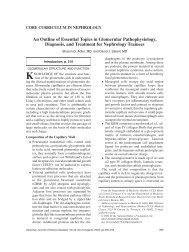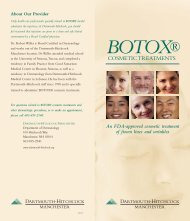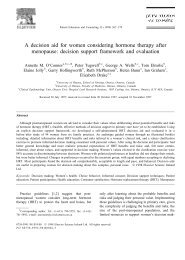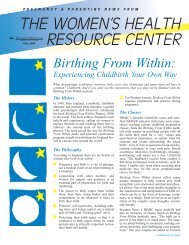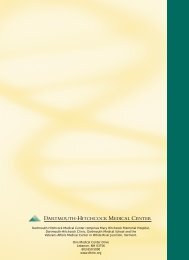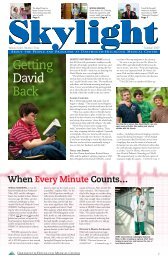Surgery and Healing in the Developing World - Dartmouth-Hitchcock
Surgery and Healing in the Developing World - Dartmouth-Hitchcock
Surgery and Healing in the Developing World - Dartmouth-Hitchcock
Create successful ePaper yourself
Turn your PDF publications into a flip-book with our unique Google optimized e-Paper software.
Medic<strong>in</strong>e Writ Large <strong>in</strong> <strong>the</strong> Raw, without Power or Plumb<strong>in</strong>g<br />
Fiberoptic Scopes, Image Intensifiers <strong>and</strong> Video-Enhanced<br />
Endoscopy<br />
No way.<br />
What Tools Work Ra<strong>the</strong>r Well <strong>and</strong> Even Get Better with<br />
Repeated Use?<br />
Eyes. F<strong>in</strong>gers, ears—<strong>and</strong> <strong>the</strong> acumen between <strong>the</strong>m.<br />
This is <strong>the</strong> golden opportunity for cl<strong>in</strong>ical skills to flourish. There are two reasons<br />
for this. Almost no one presents with early stage disease, <strong>and</strong> <strong>the</strong> classic full-blown<br />
textbook picture (almost exclusively reserved <strong>in</strong> historic textbooks <strong>in</strong> <strong>the</strong> western<br />
world now) surround <strong>the</strong> healthcare worker daily. Some diagnoses are so obvious<br />
that <strong>the</strong>y are apparent at a glance, <strong>in</strong> a liv<strong>in</strong>g museum of physical f<strong>in</strong>d<strong>in</strong>gs. Far from<br />
be<strong>in</strong>g a “no-bra<strong>in</strong>er” <strong>in</strong> terms of diagnostic challenge, <strong>the</strong> typical patient might cause<br />
you to scramble for your camera to record your own atlas of advanced pathology.<br />
When two-thirds of <strong>the</strong> gut is <strong>in</strong> <strong>the</strong> scrotum, <strong>the</strong> diagnosis of hernia is not very<br />
difficult, but <strong>the</strong> concepts such a hernia may recall to m<strong>in</strong>d <strong>in</strong>clude <strong>the</strong> “loss of<br />
doma<strong>in</strong>” <strong>and</strong> concern that <strong>the</strong> patient might not be able to brea<strong>the</strong> with <strong>the</strong> diaphragm<br />
when such a hernia is reduced. Now is <strong>the</strong> time to reach back <strong>in</strong>to <strong>the</strong> hard<br />
disc memory banks for <strong>the</strong> names of entities that are recognizable at an <strong>in</strong>formed<br />
glance: “sabre sh<strong>in</strong>s,” “Charcot jo<strong>in</strong>ts”, “Argylle-Robertson pupils”, “mulberry <strong>in</strong>cisors”<br />
were just names to be memorized for test-tak<strong>in</strong>g until I encountered <strong>the</strong>m all<br />
<strong>in</strong> a s<strong>in</strong>gle day <strong>in</strong> a Nigerian outpatient cl<strong>in</strong>ic. Here one will encounter <strong>the</strong> throwback<br />
to <strong>the</strong> prepharmaceutical era of “organiz<strong>in</strong>g pneumonia”, measles pneumonia,<br />
post-men<strong>in</strong>gitic deafness or bl<strong>in</strong>dness, <strong>and</strong> <strong>the</strong> classic signs of vitam<strong>in</strong> deficiencies<br />
<strong>and</strong> prote<strong>in</strong>/calorie malnutrition. In a later chapter, <strong>the</strong> exotic diseases rarely encountered<br />
outside <strong>the</strong> tropics can be sampled. But here it should be po<strong>in</strong>ted out that<br />
<strong>the</strong> cl<strong>in</strong>ician should know <strong>the</strong> st<strong>and</strong>ard diseases encountered <strong>in</strong> <strong>the</strong> western world,<br />
but here encountered <strong>in</strong> much later from as <strong>the</strong>y have run most of <strong>the</strong> natural history<br />
of <strong>the</strong> disease by <strong>the</strong> time <strong>the</strong>y are first seen by a western-tra<strong>in</strong>ed physician.<br />
That is also true for <strong>the</strong> cl<strong>in</strong>ical skills that are needed. There will not be as much<br />
need for some special sta<strong>in</strong> or recognition of which k<strong>in</strong>d of trypanosomiasis or schistosomiasis<br />
species is caus<strong>in</strong>g <strong>the</strong> disease, as <strong>the</strong> careful use of <strong>the</strong> cl<strong>in</strong>ical skills <strong>in</strong><br />
physical exam<strong>in</strong>ation already <strong>in</strong> <strong>the</strong> possession of most of <strong>the</strong> healthcare workers<br />
who will come to this <strong>in</strong>troduction already equipped. Know <strong>the</strong> western disease<br />
patterns well <strong>and</strong> be prepared to be surprised on how amaz<strong>in</strong>gly obvious many of<br />
<strong>the</strong> problems are simply on <strong>the</strong> basis of <strong>the</strong>ir late presentation. Record keep<strong>in</strong>g is<br />
m<strong>in</strong>imal, but significant, with most cl<strong>in</strong>ics us<strong>in</strong>g <strong>the</strong> equivalent of a 3 by 5 card as<br />
<strong>the</strong> patient’s “chart”. The life expectancy of a paper record is not more than two<br />
ra<strong>in</strong>y seasons, though, so for personal <strong>in</strong>terest, I have always carried a h<strong>and</strong> held tape<br />
recorder <strong>and</strong> some small personal electronic record keep<strong>in</strong>g system as well as photography<br />
<strong>and</strong> a notepad. Many times <strong>in</strong> cl<strong>in</strong>ic, <strong>the</strong> “history” is taken through translators,<br />
but often it is as unnecessary as <strong>the</strong> lift<strong>in</strong>g of an <strong>in</strong>volved extremity with a self<br />
evident problem.<br />
And <strong>the</strong>se cl<strong>in</strong>ical skills improve while on <strong>the</strong> field <strong>and</strong> do not have a tendency to<br />
break down. Fur<strong>the</strong>rmore, <strong>the</strong>y are quite capable of be<strong>in</strong>g transmitted, <strong>and</strong> pass<strong>in</strong>g<br />
<strong>the</strong>m along to o<strong>the</strong>rs gives a multiplier effect. The most useful cl<strong>in</strong>ical tools <strong>in</strong> <strong>the</strong><br />
field hospital are <strong>the</strong> same ones that are longest lived <strong>and</strong> regenerative, as skill is<br />
synergistically passed along <strong>and</strong> communicated—-<strong>in</strong> each direction.<br />
31<br />
5



